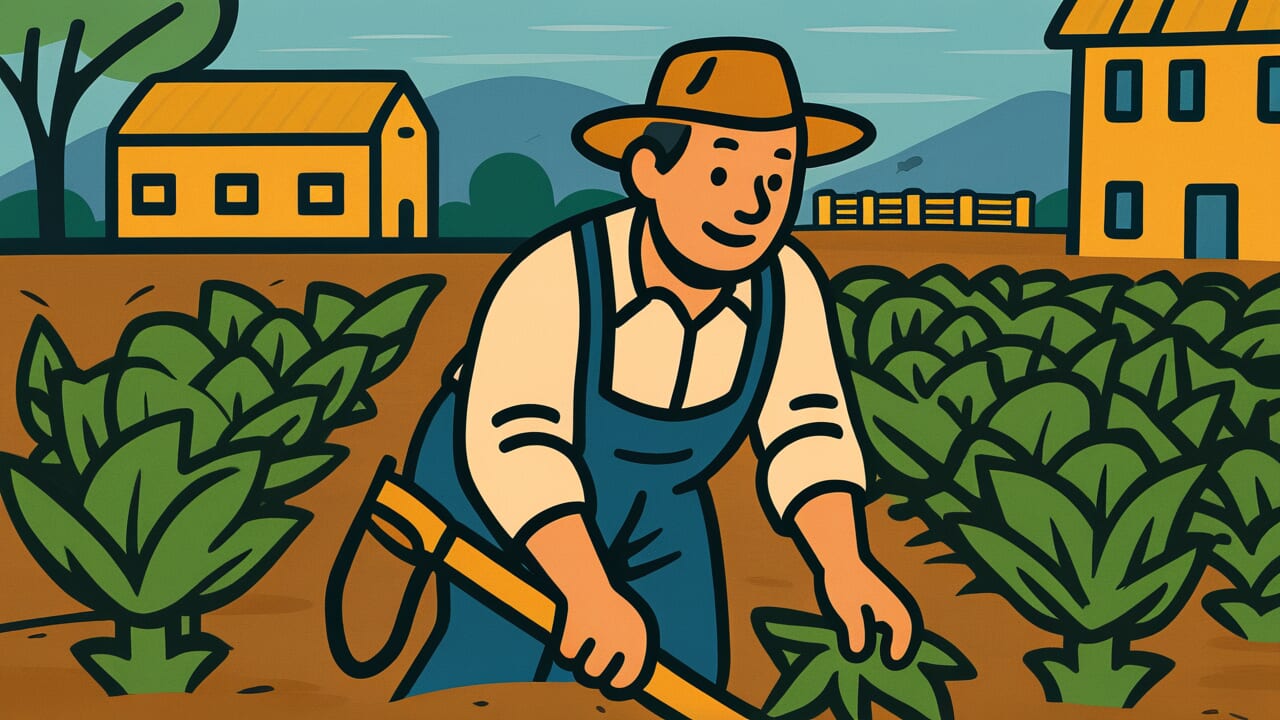How to Read “Dealing with evil is like a farmer working hard to remove weeds”
Aku wo miru koto, nōfu no tsutomete kusa wo saru ga gotoshi
Meaning of “Dealing with evil is like a farmer working hard to remove weeds”
This proverb teaches that when you find something bad, you should remove it right away. Just like a farmer pulls out weeds without waiting.
When farmers see weeds, they pull them out immediately. We should do the same with bad thoughts in our minds or unfair things in society. We need to remove them while they’re still small.
This saying is used when we want to show how dangerous it is to ignore bad things. Weeds spread across the whole field if left alone. They can kill the crops.
Small bad things work the same way. If you ignore them, they become big problems. That’s why it’s important to deal with bad things as soon as you find them.
Even today, this lesson matters. At work or in relationships, solving small problems early is still important. This proverb teaches us to face problems with courage instead of putting them off.
Origin and Etymology
This proverb likely comes from ancient Chinese philosophy, especially Confucian teachings. Confucianism teaches people to keep their minds and bodies pure. To do this, you must actively remove evil.
The phrase “a farmer working hard to remove weeds” contains practical wisdom from farming societies. For farmers, weeds are the enemy. They stop crops from growing well.
Weeds quickly cover the field if ignored. They steal nutrients and sunlight from important crops. That’s why farmers pull out weeds as soon as they see them.
This isn’t just simple work. It’s a serious duty to protect the harvest.
This proverb compares evil in our hearts and society to weeds in a field. Weeds are easy to pull when they’re small. But once their roots grow deep, removing them becomes very hard.
Evil works the same way. Handle it when it’s small, and it won’t cause big trouble. But if you ignore it, it can lead to disaster.
This saying uses everyday farming to teach moral lessons. It shows the wisdom of people from long ago.
Usage Examples
- If you find dishonesty at work, report it right away. Dealing with evil is like a farmer working hard to remove weeds.
- When children develop bad habits, fix them early. Dealing with evil is like a farmer working hard to remove weeds.
Universal Wisdom
This proverb has lasted so long because it understands human weakness. When we see something bad, we often pretend not to notice.
We think, “It’s still small, so it’s okay.” Or “Someone else will handle it.” Or “I don’t want to get involved in trouble.”
But wise people from the past knew that ignoring problems is most dangerous. Just like a field becomes wild when farmers ignore weeds, our hearts and society fall apart when we ignore evil.
The problem is that evil never disappears by itself. Instead, it grows deeper roots over time. It becomes harder and harder to remove.
This proverb has another deep insight. It appears in the word “working hard.” Pulling weeds isn’t fun for farmers. They must bend their backs, sweat, and keep going patiently.
It’s hard, steady work. Facing evil is the same. It takes courage. Sometimes it’s a lonely battle.
But humans can work hard for what’s right. This proverb believes in human dignity and potential. It keeps telling us that courage to face small evils brings rich rewards.
When AI Hears This
When farmers pull weeds, they actually use an “addition” strategy, not “subtraction.” They don’t just remove weeds physically. They focus limited resources like light, water, and nutrients on crops.
This creates an environment where weeds can’t survive. In ecology, this is called the “competitive exclusion principle.” Two species competing for the same resources can’t coexist. One must disappear.
The deep insight of this proverb isn’t about “removing” evil. It’s about “giving resources to good.” Think of the human mind as limited space.
If you pour time and energy into good habits and thoughts, bad habits have no room to enter. Their “niche” naturally disappears.
For example, if you fill your morning time with reading, the habit of scrolling through your phone dies from lack of resources. It’s natural selection.
What’s interesting is that farmers pull weeds every day. Ecologically speaking, weed seeds keep flying in constantly. One weeding session isn’t enough.
To maintain crops as the dominant species, you need continuous resource allocation. This perfectly matches the teaching that keeping goodness requires daily effort.
The fight against evil isn’t about “removal.” It’s about “occupying the ecosystem with good”—a more fundamental competitive strategy.
Lessons for Today
This proverb teaches us that when we notice a problem, that’s our chance to act. When small doubts or worries appear in your heart, that’s a sign. When something feels wrong at work, that’s a sign.
It means “deal with this now.”
Modern life gives us many temptations to put off problems. We’re busy. We worry about relationships. We pretend not to see things. But this proverb speaks to us gently yet powerfully.
Don’t put off until tomorrow what you can do today.
The important thing is not to aim for perfection. Farmers don’t pull all the weeds at once either. They remove a little each day, starting with what they notice.
You can do the same. Just face the small problem you noticed today.
And don’t forget this: Your effort to remove evil will definitely bring rich rewards. In a well-tended field of the heart, the crop of hope grows.
The small step you take today with courage will make tomorrow’s you shine.



Comments